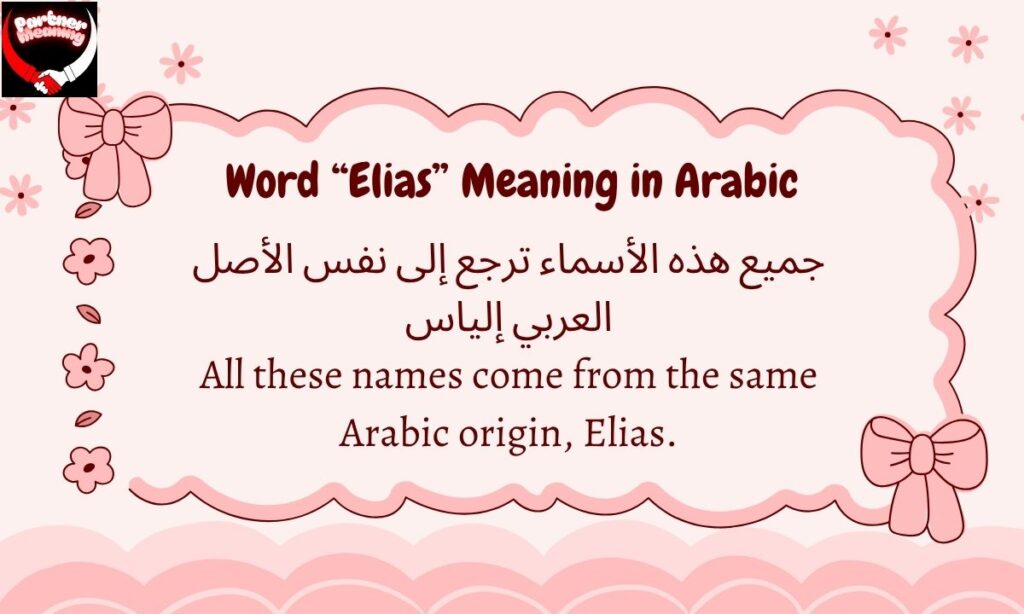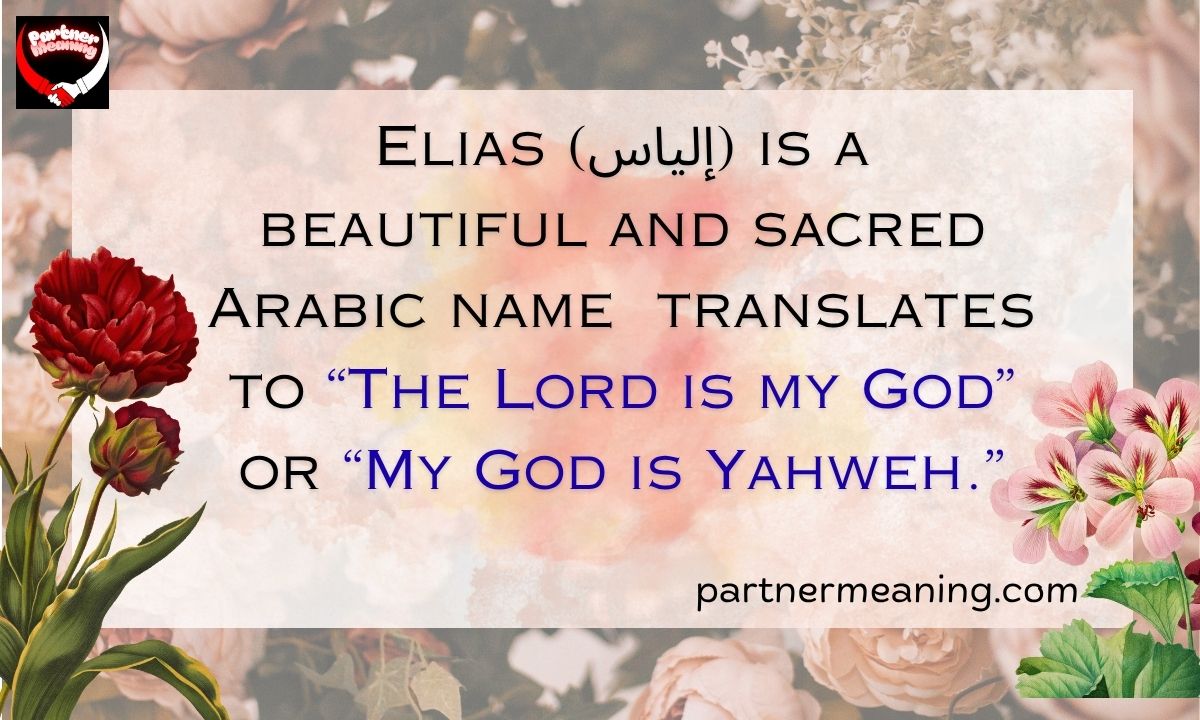The name Elias (إلياس) carries a deep spiritual and historical legacy across Arabic, Hebrew, and Greek traditions. It’s a prophetic name honored in both Islam and Christianity, symbolizing faith, devotion, and divine guidance. Loved for its timeless sound and sacred meaning, Elias connects believers through history and faith.
What Does the Name “Elias” Mean in Arabic?
The name Elias (إلياس) is a beautiful and sacred Arabic name that carries deep religious meaning. It translates to “The Lord is my God” or “My God is Yahweh.” In both Arabic and Hebrew, the name reflects strong faith and belief in one true God. It’s a name mentioned in the Quran, associated with a noble prophet who called his people to righteousness.
In Arabic culture, the name Elias is respected for its purity, devotion, and spiritual power. It connects people across Islamic, Christian, and Jewish traditions, representing unity through faith. Parents often choose it to bless their sons with a name of honor and guidance.
Arabic Quote:
إلياس نبي من أنبياء الله دعا قومه إلى عبادة الله وحده
Elias was a prophet of God who called his people to worship Allah alone.
The name’s Arabic pronunciation is “Il-yas,” with the emphasis on the first syllable. It sounds graceful and strong, much like the faith it represents. The Arabic script إلياس flows beautifully in calligraphy, especially in Thuluth or Diwani styles, symbolizing its noble roots.
The Origin and Etymology of the Name Elias
The origin of Elias goes back to the Hebrew name Eliyahu (אליהו), which combines two sacred parts: “Eli” (my God) and “Yah” (Yahweh). Over time, this name was adapted into Greek as Elias (Ηλίας) and then into Arabic as إلياس. Despite the language shifts, its core meaning of divine faith remained unchanged.
This evolution shows how religious names traveled through cultures—from ancient Israel to Greece and Arabia—carrying spiritual values. In Islam, the name Elias was preserved in its purest form, maintaining its connection to prophecy and monotheism.
Arabic Quote:
اسم إلياس أصله عبري ويعني الرب إلهي
The name Elias originates from Hebrew and means “The Lord is my God.”
Key points about the name’s origin:
- Hebrew: Eliyahu – “My God is Yahweh”
- Greek: Elias – A form used in early Christian texts
- Arabic: إلياس – Quranic name for Prophet Ilyas
- Meaning: Faith, devotion, and oneness of God
The transition between languages reflects the shared beliefs of Abrahamic faiths. Whether spoken in Hebrew, Greek, or Arabic, Elias remains a timeless declaration of faith.
Prophet Ilyas (Elias) in the Quran and Islamic Tradition
In the Quran, Prophet Ilyas (إلياس) is mentioned as a righteous messenger who called his people to abandon idols and worship Allah alone. His story appears in Surah As-Saffat (37:123–132) and highlights his unwavering devotion despite the rejection of his people.
Arabic Verse:
وَإِنَّ إِلْيَاسَ لَمِنَ الْمُرْسَلِينَ
“And indeed, Elias was among the messengers.” – (Quran 37:123)
Prophet Ilyas preached with courage and truth, reminding people that worldly idols could never bring peace. His message was simple yet powerful: faith in Allah brings salvation. His story is a model of steadfastness for all believers.
Muslims and Christians both revere Elias as a prophet of truth. In Christianity, he is known as Elijah, who performed miracles and ascended to heaven. In Islam, Ilyas is remembered for his piety, patience, and trust in God’s promise.
Linguistic Roots and Arabic Grammar of Elias (إلياس)
The name Elias (إلياس) is a proper noun in Arabic and does not follow typical three-letter root patterns used in most Arabic words. It remains unchanged in all grammatical cases—subject, object, or possessive. This stability adds to its strength and purity in Arabic linguistics.
Arabic Example:
إلياس اسم علم مذكر لا يتغير في الحالات الإعرابية
Elias is a masculine proper noun that does not change in grammatical cases.
In Arabic, Elias is always masculine and does not have a feminine or plural form. It is used without the definite article “ال”, meaning you never say الإلياس—just إلياس. It’s immediately recognized as a prophet’s name, carrying spiritual respect.
Key grammatical points:
- إلياس is a masculine proper noun
- No plural or feminine forms
- No definite article used
- Unchanged in all grammatical positions
This linguistic consistency mirrors the name’s spiritual steadfastness—unchanging, pure, and strong in meaning across generations.
Examples of the Name “Elias” in Arabic Sentences
Here are five natural Arabic examples showing how the name Elias is used in daily language and religious context:
- إلياس نبي مذكور في القرآن الكريم
Elias is a prophet mentioned in the Holy Quran. - اختار الوالدان اسم إلياس تيمناً بالنبي الصالح
The parents chose the name Elias in honor of the righteous prophet. - يحب الأطفال سماع قصة النبي إلياس في المدرسة
Children love hearing the story of Prophet Elias at school. - إلياس دعا قومه إلى عبادة الله وحده لا شريك له
Elias called his people to worship Allah alone, without partners. - اسم إلياس من الأسماء المباركة في الإسلام والمسيحية
The name Elias is among the blessed names in Islam and Christianity.
Each of these sentences shows how إلياس carries respect, faith, and history in everyday Arabic. It’s a living reminder of divine guidance that continues to inspire across languages and generations.
إلياس رمز للإيمان والثبات على الحق
Elias is a symbol of faith and steadfastness in truth.
Cultural and Religious Significance of Elias Across Faiths
The name Elias (إلياس) carries deep cultural and spiritual weight in all Abrahamic religions—Islam, Christianity, and Judaism. In Islam, Prophet Ilyas is remembered as a messenger who guided his people to worship Allah alone. Christians know him as Elijah, a prophet who performed miracles and defended faith against false gods.
إلياس نبي دعا إلى التوحيد وترك عبادة الأصنام
Elias was a prophet who called for monotheism and the rejection of idols.
In Arabic culture, the name Elias represents faith, purity, and devotion. It reminds believers to remain steadfast in truth and trust in God’s plan. Across generations, Arabic poets and scholars have mentioned إلياس as a symbol of righteousness and divine strength.
Muslims, Christians, and Jews all honor the name for its connection to prophetic history. It’s a name that unites people across borders, showing how faith transcends language and culture. Choosing Elias reflects respect for spiritual legacy and unity among believers.
Common Spelling Variations: Elias, Ilyas, and Elyas

The name Elias has several English spellings, but they all come from the same Arabic root إلياس. The most common forms include Elias, Ilyas, and Elyas. These are simply transliteration differences, influenced by region, language, or personal preference.
Arabic Example:
جميع هذه الأسماء ترجع إلى نفس الأصل العربي إلياس
All these names come from the same Arabic origin, Elias.
Here’s a clear comparison of the variations:
- Elias (إلياس) – Common in English-speaking and Christian communities.
- Ilyas (إلياس) – Most used in Muslim and Arabic contexts.
- Elyas (إلياس) – A less common but valid spelling.
- Iliyas / Elyass – Regional forms seen in South Asia.
All versions share the same meaning and pronunciation (Il-yas). The Arabic spelling never changes, preserving the purity of the prophetic name. This consistency reflects how faith and language preserve sacred identity across time and culture.
تختلف التهجئات في الإنجليزية، لكن المعنى العربي واحد
The English spellings differ, but the Arabic meaning remains the same.
Famous People Named Elias Around the World
Many well-known figures carry the name Elias, giving it a presence in sports, art, science, and history. Each has contributed to the global recognition of this timeless name. From ancient prophets to modern achievers, Elias represents wisdom, creativity, and leadership.
يحمل اسم إلياس كثير من الشخصيات البارزة حول العالم
Many notable figures around the world bear the name Elias.
Some famous examples include:
- Elias Figueroa – Legendary Chilean soccer player.
- Elias Howe – Inventor of the sewing machine.
- Elias Koteas – Canadian actor known for diverse roles.
- Elias Lindholm – Swedish professional hockey player.
- Elias Harger – American child actor from Fuller House.
These names show how Elias transcends religion and culture, becoming a name recognized for achievement, respect, and global influence. It’s a name that combines ancient honor with modern success.
Popularity and Modern Use of the Name Elias
Today, Elias is one of the most popular boy names in many countries. Its rise in use reflects people’s desire for meaningful, faith-based names that also sound elegant and modern. The name bridges the ancient and the contemporary, making it perfect for today’s families.
اسم إلياس ينتشر بين المسلمين والمسيحيين في العالم الحديث
The name Elias is popular among Muslims and Christians in the modern world.
In recent years:
- Rank #25 among boys in the U.S. (2024).
- Top 50 name in several European countries.
- Common in Arabic-speaking regions for its Quranic value.
- Frequently chosen for its simplicity and strength.
The global popularity of Elias shows how faith and beauty can coexist in a single name. It’s seen as a name of hope, intelligence, and moral character, loved by parents across cultures.
Why the Name Elias Remains a Timeless Choice
The name Elias (إلياس) has stood strong through centuries of faith and language. Its message of devotion, purity, and truth continues to inspire people today. Whether in religious texts or modern life, the name reminds us of the power of belief and moral courage.
يبقى اسم إلياس رمزاً للإيمان والصدق في كل زمان
The name Elias remains a symbol of faith and honesty for all time.
Elias connects generations—from ancient prophets to modern believers—through one shared principle: “My God is Yahweh.” It’s not just a name, but a declaration of spiritual strength. Parents who choose Elias give their child a heritage of honor and devotion.
In every culture and faith, Elias endures as a timeless name, cherished for its sacred roots and universal beauty. It stands for hope, resilience, and divine love, values that never fade with time.
Conclusion
The name Elias (إلياس) continues to shine as a symbol of faith, devotion, and divine guidance. Rooted in the stories of prophets and honored across religions, it reminds believers of truth, strength, and spiritual purpose. Whether read in the Quran or spoken in prayer, Elias carries timeless grace and reverence.
Frequently Asked Questions
What is the meaning of Elias in Arabic?
It means “My God is Yahweh” (إلهي يهوه) and reflects strong faith in one God.
Is Elias mentioned in the Quran?
Yes, Prophet Ilyas (إلياس) is mentioned in the Quran as a righteous messenger.
Are Elias and Ilyas the same name?
Yes, Elias and Ilyas are the same name with different spellings in Arabic and Greek.
What does the name Elias symbolize in Islam?
It symbolizes steadfast belief, truth, and devotion to Allah.
How is Elias pronounced in Arabic?
It’s pronounced as “Il-yas” (إلياس) with emphasis on the second syllable.
What is the origin of the name Elias?
It comes from Hebrew (Elijah) and was later adopted into Arabic as Ilyas (إلياس).
Is Elias a popular name today?
Yes, it’s a trending name worldwide, loved for its spiritual and modern appeal.

Hayyat is a passionate writer and researcher who loves exploring the beauty and depth of Arabic language and culture. With a special interest in Arabic names, Qur’anic words, and Islamic heritage, Hayyat aims to share meaningful insights with readers who appreciate names with purpose and history.











